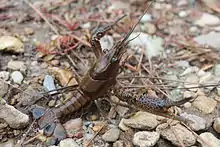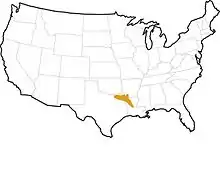Procambarus natchitochae
Procambarus natchitochae, or the Red River creek crayfish, is a crayfish native to the Red River basin and Bayou Teche in Texas, Louisiana, and Arkansas.[3] Its distribution is given by the IUCN here, whereas a slightly different Louisiana map is provided in the "Crawfishes of Louisiana", which excludes Bayou Teche [3][4] P. natchitochae has a distribution of approximately 46,000 km2.[4]

| Procambarus natchitochae | |
|---|---|
 | |
| Scientific classification | |
| Kingdom: | |
| Phylum: | |
| Subphylum: | |
| Class: | |
| Order: | |
| Family: | |
| Genus: | |
| Subgenus: | |
| Species: | P. natchitochae |
| Binomial name | |
| Procambarus natchitochae Penn, 1953[2] | |
Identification
An individual crayfish can be identified to a group of a few species within the genus and subgenus Procambarus (Pennides) by looking at a few distinguishing characteristics. Two pairs of cervical spines, a broadly open areola, and lateral rostral spines are diagnostic physical features that characterize P. natchitochae, P. vioscai, P. dupratzi, and P. pentastylus from other species of crayfish.[3] Color is not always a reliable characteristic in identification, but P. natchitochae (and the three other species above) generally have a dark brown saddle on the posterior part of the carapace and dark lateral stripes on the abdomen.[3] Form I male gonopod characteristics or collection location are required for species level identification.[3]
Conservation status
Procambarus natchitochae live in streams and ditches with flowing current, clear to cloudy water, and rocky to sandy substrates.[3][4] The species is endemic to the United States and is listed as a species of least concern by the IUCN.[4]
NatureServe gives P. natchitochae a global rating of G5, or 'secure', and a national ranking of N5 for 'secure',[5] while at the state level, Louisiana ranks it as S4, for 'Apparently secure', and Arkansas and Texas rate it as SNR, or 'State Not Ranked'.[5] The American Fisheries Society ranks it as 'Currently Stable'.[4] Conservation assessment is lacking for this species because there are little available data on the population or threats, other than the current species distribution.[5]
History
The P. natchitochae holotype, allotype, and morphotype were collected from a tributary of Spring Creek at Melder, on State Route 85, in Rapides Parish, Louisiana. The type specimens are currently housed at the National Museum of Natural History, Smithsonian Institution, Washington D.C.[2][6] under catalog numbers 93649, 93650, 93651 (Male Form I, Female, Male Form II, respectively).[2][6]
References
- Crandall, K.A. (2010). "Procambarus natchitochae". IUCN Red List of Threatened Species. 2010: e.T153996A4574125. doi:10.2305/IUCN.UK.2010-3.RLTS.T153996A4574125.en. Retrieved 19 November 2021.
- Penn, G. H. Jr. (1953). "Two new crawfishes of the genus Procambarus from Texas, Louisiana, and Arkansas (Decapoda, Astacidae)". American Museum Novitates (1636): 1–10. hdl:2246/4871.
- Walls, Jerry G. (2009). Crawfishes of Louisiana (1st ed.). Louisiana State University Press. pp. 184–185. ISBN 9780807134092.
- K. A. Crandall (2010). "Procambarus natchitochae". IUCN Red List of Threatened Species. 2010: e.T153996A4574125. doi:10.2305/IUCN.UK.2010-3.RLTS.T153996A4574125.en.
- "Procambarus natchitochae". NatureServe. Retrieved 9 March 2015.
- Crandall, Keith A.; James W. Fetzner Jr. & Horton H. Hobbs Jr. (1 January 2001). "Procambarus (Pennides) natchitochae Penn 1953". The Tree of Life Web Project. Retrieved 10 April 2015.
